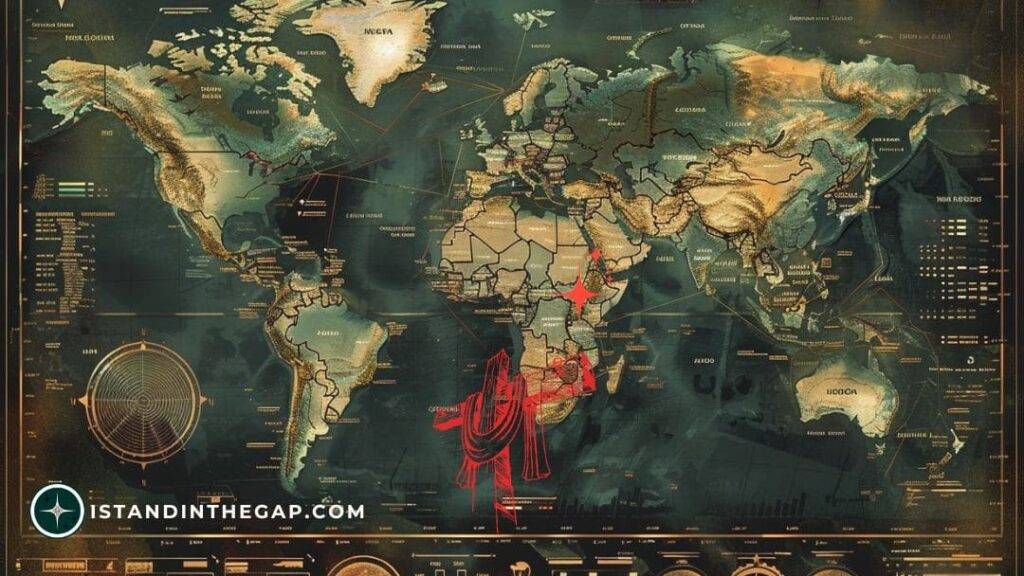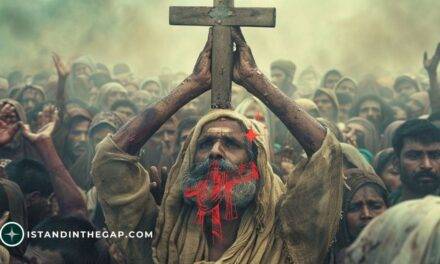Christian persecution is a harsh reality faced by many believers around the world.
In this researched work, we will explore the different aspects of Christian persecution – from its occurrence to the reasons behind it and its devastating effects.
We will also delve into the statistics surrounding this issue, shedding light on the number of countries affected and the staggering figures of Christians killed or imprisoned for their faith.
Let’s discuss how we can help persecuted Christians and make a difference in their lives.
Key Takeaways Christian Persecution Around the World With Statistics:
- Christian persecution occurs in various forms such as violence, discrimination, and imprisonment, and is driven by religious intolerance, political oppression, and cultural hostility.
- Christians around the world face persecution in over 70 countries, with millions killed and imprisoned for their faith.
- People can help persecuted Christians by raising awareness, supporting organizations and efforts, and praying for their safety and protection.
What Is Christian Persecution?

Christian persecution refers to the systemic mistreatment, discrimination, and violent attacks against Christians due to their religious beliefs, a phenomenon that has persisted from the Roman Empire under Nero to modern persecution cases documented by organizations like Open Doors.
In history, Christians have faced persecution for various reasons, from political motivations to societal intolerance. The Roman Empire, notorious for its brutal treatment of Christians, used persecution as a tool to maintain control.
From the Crusades to the Spanish Inquisition, Christian persecution took various forms.
Throughout history, Christianity has been both a victim and an instigator of persecution, exemplified by events such as the Salem witch trials and the Rwandan Genocide where Christians were both persecuted and perpetrators of violence.
Where Does Christian Persecution Occur?
Christian persecution occurs in various regions around the world, with countries like North Korea, Afghanistan, and Northern Nigeria being some of the most dangerous places for Christians according to the World Watch List compiled by Open Doors.
Countries With Highest Levels of Persecution
Countries with the highest levels of Christian persecution include North Korea, where Christians face severe punishment in prison camps, Afghanistan, where the Taliban imposes harsh restrictions, and Nigeria, where Boko Haram frequently targets Christian communities.
- North Korea’s oppressive regime eradicates any hint of religious freedom, with Christians facing relentless surveillance and severe consequences if caught practicing their faith.
- In Afghanistan, the Taliban’s strict interpretation of Islam leads to Christians being branded as enemies of the state, facing threats, violence, and even death.
- Nigeria’s ongoing conflict with Boko Haram has resulted in countless attacks on Christians, with churches bombed, villages raided, and believers kidnapped or killed as part of the group’s extremist agenda.
Types of Persecution Faced by Christians
Christians face various types of persecution, including:
- Abductions,
- Physical violence,
- Systemic discrimination in employment and education, and
- Targeted church attacks.
Abductions of Christians are not uncommon in regions plagued by conflict and extremism.
For example, in Nigeria, Boko Haram has been known to kidnap Christian girls and women, forcing them into marriage or slavery. The physical violence against Christians often escalates to horrific levels, with reports of torture and even death for refusing to renounce their faith.
Systemic discrimination in employment and education can severely limit the opportunities available to Christian individuals. In countries like Pakistan, Christians struggle to secure decent jobs or access higher education due to prevalent biases and discriminatory practices.
Targeted church attacks are orchestrated by militant groups like the Taliban in Afghanistan. These violent assaults not only destroy places of worship but also instill fear and insecurity among the Christian communities, often leading to mass exodus in search of safety.
What Are the Reasons for Christian Persecution?
Christian persecution can be attributed to several reasons, including:
- Religious intolerance, where dominant religious groups view Christianity as a threat,
- Political oppression, where authoritarian regimes suppress religious freedom, and
- Cultural hostility, where societal norms and traditions clash with Christian beliefs.
Religious Intolerance

Religious intolerance is a major driver of Christian persecution, often perpetrated by non-state actors like the Islamic State and the Houthi movement, who view Christianity as incompatible with their religious ideologies.
These groups have carried out heinous acts of violence, including bombings of churches, targeted killings of Christians, and forced conversions, aiming to eradicate Christianity from their territories.
The impact of such persecution goes beyond the immediate victims, causing fear and displacement among Christian communities and threatening the diversity of religious beliefs in those regions.
This erosion of religious freedom not only affects Christians but also sets a dangerous precedent for all minority religious groups, undermining the principles of tolerance and coexistence in society.
The actions of these extremist groups have far-reaching consequences, creating a climate of fear and insecurity for religious minorities worldwide.
Political Oppression
Political oppression is another significant cause of Christian persecution, particularly in countries with fascist governments or communist regimes like Eritrea, Iran, and Cuba, where religious freedom is severely restricted.
These political systems often utilize laws and policies to suppress religious minorities, including Christians, and maintain control over the population.
For example,
- In Eritrea, the government closely monitors and controls religious activities, requiring permits for all religious gatherings.
- Iran’s strict interpretation of Sharia law leads to discrimination and persecution of Christians, who face imprisonment and even death for their faith.
- Similarly, in Cuba, the Communist regime limits religious practices and tightly controls religious institutions, hindering the spread of Christianity.
Cultural Hostility
Cultural hostility towards Christians is prevalent in countries like India and Myanmar, where societal norms and traditions create an environment of discrimination and violence, leading to the displacement of many Christians.
In India, for example, Christians often face hostility due to their religious beliefs, with incidents of violence, forced conversions, and attacks on churches reported across the country.
On the other hand, Myanmar’s history of religious tensions has also led to discrimination against Christians, particularly in regions with a strong Buddhist presence.
These cultural dynamics not only impact the physical safety of Christians but also result in deep-rooted social ostracization, making it challenging for displaced Christians to rebuild their lives and find acceptance in new communities.
What Are the Effects of Christian Persecution?
The effects of Christian persecution are profound, leading to the displacement of Christian communities, instances of martyrdom, and alarming persecution statistics reflecting widespread suffering and injustice.
When Christian communities are displaced due to persecution, they not only lose their physical homes but also their sense of belonging and security.
The trauma of witnessing or experiencing martyrdom can have long-lasting psychological impacts on individuals, perpetuating fear and anxiety within communities.
The prevalence of alarming persecution statistics serves as a stark reminder of the systematic targeting and discrimination faced by Christians around the world, highlighting the urgent need for advocacy and intervention to protect the rights and well-being of those affected.
How Are Christians Persecuted?
Christians are persecuted through various means, including violent attacks, imprisonment, torture, and targeted church attacks, as seen in the experiences of Chinese Christians and those in other high-risk regions.
Physical Violence

Physical violence against Christians includes brutal attacks by groups like Boko Haram and al-Shabaab, who frequently target Christian communities with bombings, shootings, and other forms of violence.
These extremist groups often carry out their attacks in places of worship, schools, and other public spaces, instilling fear and causing devastation among the Christian population.
The relentless assaults not only result in loss of lives but also lead to displacement, trauma, and a sense of insecurity among survivors, disrupting the social fabric of these communities.
The recurring violence perpetuates a cycle of fear and persecution, restricting the freedom of worship and expression for Christians in these regions.
Discrimination and Marginalization
Discrimination and marginalization are common forms of persecution, especially in countries with fascist governments or strict state controls like China, where Chinese Christians face systemic exclusion from social, economic, and political spheres.
This exclusion has led to severe limitations on their ability to fully participate in society, hindering their access to education, employment, and healthcare.
In other restrictive regimes, such as North Korea or Iran, Christian communities also experience similar challenges, with restrictions on practicing their religion openly and facing discrimination in the public domain.
The long-term effects of such exclusion are detrimental, as it perpetuates cycles of poverty and underdevelopment within these marginalized communities. Limited access to resources and opportunities further exacerbates their already vulnerable position within society.
Imprisonment and Torture
Imprisonment and torture are severe forms of persecution faced by Christians, with egregious examples seen in North Korean prison camps and under the Taliban’s rule, as highlighted by reports from the United States Commission on International Religious Freedom.
One of the most alarming aspects of these cases is the inhumane treatment inflicted upon individuals simply for their faith. Reports detail harrowing accounts of physical and psychological torture that prisoners endure, including beatings, starvation, and even public executions.
In North Korean prison camps, prisoners are subjected to slave-like conditions, where they are forced to perform strenuous labor and have minimal access to basic necessities.
On the other hand, under the Taliban, individuals are often imprisoned for their religious beliefs, facing brutal interrogation methods and severe restrictions on their rights.
What Are the Statistics of Christian Persecution?
Statistics of Christian persecution reveal a grim reality, with organizations like Open Doors providing detailed martyrdom statistics and data on the number of countries where Christians face severe persecution.
Number of Countries Where Christians Face Persecution
According to the World Watch List by Open Doors, Christians face persecution in over 50 countries, with varying levels of severity and different forms of persecution.
Some of the countries highlighted on the list include North Korea, where Christians are forced to practice their faith in secret due to the strict regime in place.
In countries like Afghanistan and Somalia, Christians face threats from radical Islamic extremism, putting their lives in danger for their beliefs.
Furthermore, in nations like Libya and Pakistan, Christians are subjected to discrimination, violence, and even imprisonment because of their religious identity.
The World Watch List sheds light on the challenges these individuals endure and the vital role of Open Doors in raising awareness and providing support to persecuted Christians worldwide.
Number of Christians Killed for Their Faith

Martyrdom statistics indicate that thousands of Christians are killed each year for their faith, with militant groups like Boko Haram and al-Shabaab being responsible for many of these deaths.
These incidents of violence are not limited to specific regions but are a global phenomenon that threatens religious freedom and security.
- For example, in Nigeria, Boko Haram has specifically targeted Christian communities, resulting in numerous killings and church bombings.
- Similarly, al-Shabaab in Somalia has also carried out attacks on Christians, including the targeting of individuals for public executions due to their faith.
Such actions by extremist groups create a climate of fear and insecurity for religious minorities, impacting not only the individuals directly affected but also the broader community.
The rise of religious persecution, generally, poses significant challenges to upholding human rights and fostering peaceful coexistence.
Number of Christians Imprisoned for Their Faith
The number of Christians imprisoned for their faith is alarmingly high, with countries like North Korea, Eritrea, and Iran known for their harsh treatment and detention of Christians in inhumane conditions.
In North Korea, the regime views Christianity as a threat to its authority, leading to imprisonment, torture, and even execution of believers. Eritrea’s government also suppresses religious freedom, imprisoning Christians for practicing their faith outside state-controlled churches.
Iran, governed by strict Islamic laws, targets Christian converts and leaders, accusing them of apostasy and proselytizing. Despite global awareness, these violations persist due to a lack of accountability.
The international community must continue to pressure these governments to uphold basic human rights and freedom of religion.
What Can Be Done to Help Persecuted Christians?
To help persecuted Christians, efforts can be made to raise awareness about their plight, supporting organizations working on the ground, and engaging in prayer and advocacy to foster positive trends in religious freedom.
Raising Awareness
Raising awareness about Christian persecution is crucial for fostering religious freedom, with organizations like the United States Commission on International Religious Freedom playing a key role in documenting and publicizing these issues.
In recent years, various campaigns and initiatives have been launched to shed light on the challenges faced by persecuted Christians globally.
For instance, the #PrayforPersecutedChristians campaign encouraged believers to pray for those facing persecution due to their faith. International organizations such as Open Doors and Aid to the Church in Need have provided support and resources to communities affected by Christian persecution.
The media, including online platforms and traditional outlets, have played a vital role in amplifying the voices of persecuted Christians. Through documentaries, news reports, and social media campaigns, stories of resilience and courage have reached a wider audience, sparking conversations and prompting action.
Supporting Organizations and Efforts
Supporting organizations like Open Doors, which are at the forefront of advocacy and relief efforts, is essential in aiding persecuted Christians, as highlighted by the work of advocates like Lisa Zengarini. These organizations play a crucial role in providing much-needed support to individuals and communities facing religious persecution.
Open Doors, for instance, offers practical assistance, including emergency relief, trauma counseling, and community development programs in regions where Christians are persecuted.
Lisa Zengarini, through her tireless efforts, has brought attention to the plight of persecuted Christians worldwide, advocating for their rights and raising awareness about the challenges they face daily.
Praying for Persecuted Christians
Prayer is a powerful tool for supporting persecuted Christians, offering them spiritual strength and solidarity in their fight for religious freedom.
In times of hardship and adversity, this act of coming together in prayer provides a sense of unity among believers, reminding them that they are not alone in their struggles.
Communities around the world have organized prayer vigils, interfaith gatherings, and online campaigns to show support for those facing persecution. Through these initiatives, individuals across different backgrounds and faiths have joined hands to uplift and protect the persecuted.
The impact of prayer in these situations goes beyond just words. It instills a sense of hope and resilience in the hearts of those who are enduring persecution, helping them find solace in their faith and the belief that better days lie ahead.
Frequently Asked Questions
What is Christian persecution and where does it occur?
Christian persecution refers to any form of discrimination, harassment, violence, or oppression against individuals or groups who identify as Christian. It occurs all around the world, with the most severe cases happening in countries like North Korea, Afghanistan, Somalia, Libya, and Pakistan.
How many Christians are currently being persecuted?
According to a report by Open Doors USA, approximately 260 million Christians are facing high levels of persecution for their faith. This number has been steadily increasing in recent years due to various political, cultural, and religious factors.
What are the main reasons for Christian persecution?
Christian persecution can be motivated by a variety of factors, including religious extremism, government policies, societal discrimination, and personal prejudices. In some cases, it may also stem from conflicts between different religious or ethnic groups.
How is Christian persecution measured and ranked?
Open Doors USA uses a World Watch List to rank countries based on the levels of persecution faced by Christians. The list takes into account factors such as violence, pressure, and discrimination against Christians, as well as the overall impact on their daily lives.
Which regions of the world have the highest rates of Christian persecution?
Christian persecution is most prevalent in regions such as the Middle East, Africa, and Asia. In the Middle East, Christians face persecution from extremist groups like ISIS and Al-Qaeda. In Africa, they often face violence and discrimination due to religious and ethnic conflicts. And in Asia, persecution can come from both government policies and societal pressures.
How can we help address and prevent Christian persecution?
There are various ways to support and advocate for persecuted Christians around the world. These include donating to organizations that provide aid and support to those facing persecution, writing to government officials to demand action, and educating others about the issue to raise awareness and promote change.

















